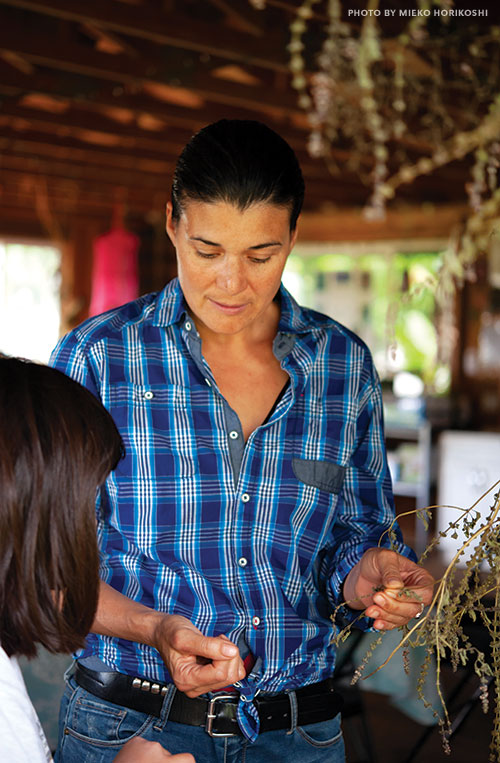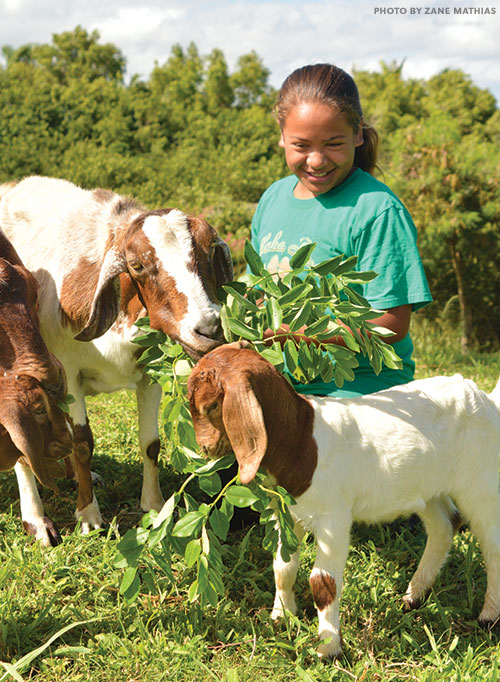
Each of the farm’s homes accommodates two mothers and their children, with each mom paying minimal rent. Generally, families stay for a year, but some are ready to graduate into the community after six months; others may need eighteen months to find affordable housing off-site.
Once she moves in, every new resident works with staff to create a personal one-year plan towards independence, then meets for quarterly reviews of her progress. During her stay, she’ll receive life-skills training through weekly classes in financial literacy, nutrition, parenting, and more. Families tend the community garden, and moms can participate in a stipend program that pays them for farm work and animal care, and prepares them for reentry into the job market by teaching basic work ethics such as commitment and responsibility, and practical skills like filling out job applications.
Farm manager Ka‘io Martin, herself a Maui Farm graduate, is passionate about helping each woman build her skills and self-esteem. “We sit with them, one on one, look at how many hours they’ve worked, [what] classes they’ve done. We get them excited about setting and meeting goals [like getting a job, or buying a car]. It’s really all about self-sufficiency. [When] you see your own growth, it feels good, yeah?”
Trina concurs. “Most of us here, we’ve seen so much ugly. Here, we learn to turn it around, see the good things, the beauty in each other and ourselves. I’ve discovered I’m really good at so many things. My [long-term] goal is to open my own restaurant.”
Families staying at the farm grow the crops and share them—not just food crops, but a thriving lā‘au lapa‘au (medicinal plant) garden. Ka‘io says, “They learn that how we tend to the ‘āina [land] is how we tend to ourselves.”
“Even after horrible abuse, land can always be brought back to life,” says Stacey Moniz, who succeeded as executive director in August 2018, when Paula retired after twenty-eight years at the helm. “You can ignore the land, mistreat it, but then you put love and energy into it, and it will flourish.”
Besides nurturing skills and values such as responsibility and patience, the simple physicality of working the land is a benefit itself. “Horticulture therapy,” Donna calls it, and farm graduate Erin Griffith wholeheartedly agrees. “It was really good to go out into the garden and just work it out, you know, with the pickaxe.” We laugh—Erin, too—but she’s serious. “I needed that to help me sort through sixteen years [of abuse], and, even before that, my childhood.”

Erin entered The Maui Farm five years ago with her children, aged two, four and six at the time. “The kids have great memories of living here, with the animals. Of course, they didn’t understand why we were here. And, honestly, I didn’t, either. When we got to the [Women Helping Women] shelter, I was very confused. My situation involved a lot of psychological abuse, [but] because I didn’t get punched in the face, [because] there was no physical violence, it wasn’t clear to me that it was abuse.
“Meeting the women here, and through the weekly group sessions, I realized mine was a textbook case. I had been a teacher before, but now I’d been a stay-at-home mom for seven years, extremely isolated from people.”
Over a year and a half, Erin immersed herself in domestic-violence-awareness programs and empowerment support groups while pursuing divorce proceedings and restraining orders against the father of her children. After graduating into a home of her own, she returned to teaching, this time with a focus on special education. “Some of my students come from domestic-violence situations. Now, having navigated through that world, I’m better equipped to teach and help these children.”
She remains in touch with her former farm mates. “We will always be sisters,” she smiles, as she remembers how the other mothers offered emotional support and advice when she returned to the farm after each agonizing Family Court hearing—more than twenty appearances in all.
This peer support springs organically from The Maui Farm’s practice of employing nonresident staff. Trina explains: “Not having staff here after hours, we feel like we’re being trusted. And we can text [staff] at any time . . . like with Ka‘iulani. Any problem I have, she’s got the know-how to fix, or just listen to me vent. She’s Wonder Woman!”
“Wonder Woman” is program assistant Ka‘iulani Spencer, whose empathy comes from personal experience. “It took me many years to leave my [former] situation. The Maui Farm made room for me and my four children. The support I received here was very empowering. . . . We say that we are making a difference in the lives of these moms, but it goes deeper than that. Because, if the children have a good, safe environment and a good understanding of it, then they will raise their children in the same way, and it will continue to trickle down.”
Like an abundant garden—flourishing, over time, from a handful of seeds.
GIVE THE FARM A HAND
The Maui Farm also serves the community beyond its gates with educational programs and volunteer opportunities. Community partners include the Maui School Garden Network, Kamehameha Schools Maui, and Maui Job Corps. Individuals and groups are welcome to volunteer for gardening, childcare, tutoring, after-school activities, and more. Visit TheMauiFarm.org or call 579-8271.





